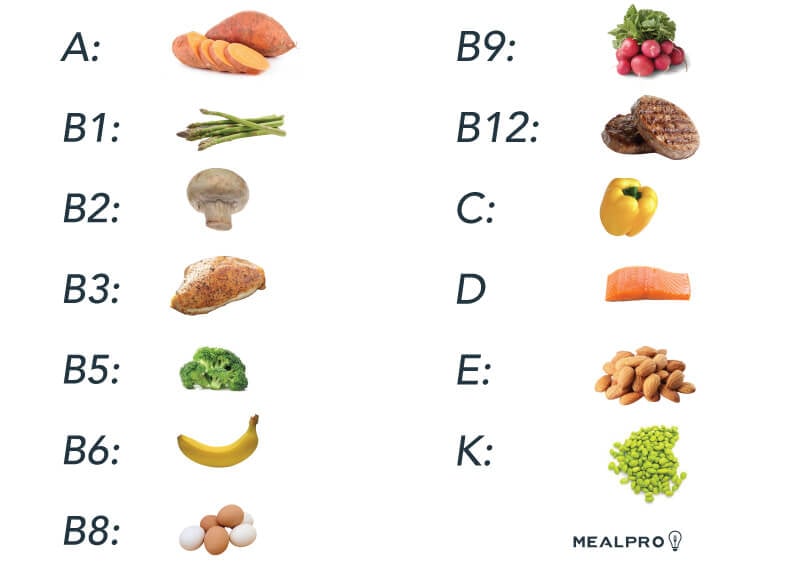
Exploring Essential Vitamins: Common Food Sources for Each Nutrient
Vitamins are organic compounds that play crucial roles in maintaining overall health and well-being. These essential nutrients are required by the body in small amounts to support various physiological processes, ranging from energy production to immune function. In this comprehensive article, we will delve into the 13 essential vitamins and highlight common food sources for each nutrient.
1. Vitamin A (Retinol)
Vitamin A is essential for vision, immune system function, and healthy skin. Common food sources include:
- Animal Sources: Liver, fish (especially salmon), dairy products, eggs.
- Plant Sources: Carrots, sweet potatoes, spinach, kale, butternut squash.
2. Vitamin D (Calciferol)
Vitamin D is crucial for bone health, immune function, and calcium absorption. Common food sources include:
- Fatty Fish: Salmon, mackerel, sardines.
- Fortified Foods: Fortified dairy products, fortified cereals, fortified plant-based milk (such as almond or soy milk).
3. Vitamin E (Tocopherol)
Vitamin E is an antioxidant that protects cells from oxidative damage. Common food sources include:
- Nuts and seeds (almonds, sunflower seeds).
- Vegetable oils (such as olive oil and sunflower oil).
- Spinach, broccoli, and other leafy greens.
4. Vitamin K (Phylloquinone)
Vitamin K is essential for blood clotting and bone health. Common food sources include:
- Leafy greens (kale, spinach, collard greens).
- Broccoli, Brussels sprouts.
- Green peas.
5. Vitamin C (Ascorbic Acid)
Vitamin C supports the immune system and collagen production. Common food sources include:
- Citrus fruits (oranges, grapefruits).
- Berries (strawberries, blueberries).
- Bell peppers, kiwi, broccoli.
6. Vitamin B1 (Thiamine)
Vitamin B1 is important for energy metabolism and nerve function. Common food sources include:
- Whole grains (brown rice, whole wheat).
- Legumes (beans, lentils).
- Pork, nuts.
7. Vitamin B2 (Riboflavin)
Vitamin B2 supports energy production and skin health. Common food sources include:
- Dairy products (milk, yogurt).
- Eggs.
- Leafy greens.
8. Vitamin B3 (Niacin)
Vitamin B3 is essential for energy metabolism and nervous system function. Common food sources include:
- Meat (chicken, turkey).
- Fish (tuna, salmon).
- Whole grains.
9. Vitamin B5 (Pantothenic Acid)
Vitamin B5 supports energy production and hormone synthesis. Common food sources include:
- Meat (beef, poultry).
- Whole grains.
- Avocado.
10. Vitamin B6 (Pyridoxine)
Vitamin B6 is important for brain function and metabolism. Common food sources include:
- Meat (chicken, turkey).
- Fish (tuna, salmon).
- Potatoes, bananas.
11. Vitamin B7 (Biotin)
Vitamin B7 is essential for skin health and metabolism. Common food sources include:
- Eggs.
- Nuts (almonds, peanuts).
- Sweet potatoes.
12. Vitamin B9 (Folate/Folic Acid)
Vitamin B9 is important for DNA synthesis and cell division. Common food sources include:
- Leafy greens (spinach, kale).
- Legumes (lentils, chickpeas).
- Fortified cereals.
13. Vitamin B12 (Cobalamin)
Vitamin B12 is crucial for nerve function and red blood cell production. Common food sources include:
- Animal products (meat, fish, poultry, dairy).
- Fortified plant-based milk.
- Eggs.
Conclusion
Understanding the sources of essential vitamins is integral to crafting a balanced and nutritious diet. By incorporating a variety of these nutrient-rich foods into our meals, we can ensure that our bodies receive the vitamins needed to support optimal health, energy production, immune function, and overall vitality. Remember that a diverse and well-rounded diet is the key to obtaining these essential nutrients and reaping their numerous benefits.



